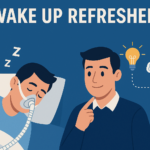If you’ve ever dealt with sleep apnea, you already know how frustrating it can be. The condition doesn’t just make you feel tired, it steals your focus, energy, and ability to concentrate on even the simplest tasks. For students or professionals who need sharp focus and long study hours, this can feel like climbing a mountain with no rest.
This is where Modalert, a well-known wakefulness-promoting medicine, steps into the conversation. While it isn’t a cure for sleep apnea itself, Modalert can help manage the daytime sleepiness and brain fog caused by the condition. Let’s explore how sleep apnea affects your brain, why focus becomes a challenge, and how Modalert can provide the boost you need to stay on top of your study goals.
Understanding Sleep Apnea and Its Impact on the Brain
When you have sleep apnea, breathing regularly stops and resumes while you’re asleep. The two most common types are obstructive sleep apnea (OSA) and central sleep apnea (CSA). In either case, the result is the same: your brain and body don’t get the quality rest they need.
How It Affects Daily Life:
- Excessive daytime sleepiness: Even after a full night’s sleep, you wake up tired.
- Memory problems: Interrupted sleep affects your brain’s ability to store and recall information.
- Difficulty concentrating: You may struggle to pay attention during lectures, work meetings, or study sessions.
- Mood changes: Irritability, stress, and anxiety are common.
For students, this creates a tough cycle: poor sleep leads to poor focus, which makes studying harder, which in turn increases stress and fatigue.
Where Modalert Comes In
Modalert (generic Modafinil) is often prescribed to people dealing with excessive sleepiness caused by sleep disorders like narcolepsy, shift work sleep disorder, and obstructive sleep apnea. While it doesn’t directly treat the breathing interruptions of sleep apnea, it helps manage one of the biggest symptoms: daytime drowsiness.
How Modalert Helps:
- Promotes Wakefulness – Modalert stimulates the brain to stay alert without the jittery side effects of caffeine or energy drinks.
- Improves Focus and Attention – By activating certain neurotransmitters, it enhances concentration, helping you absorb study material more effectively.
- Boosts Memory and Learning Ability – Research suggests Modalert may improve working memory, making it easier to retain what you learn.
- Stabilizes Mood – Better focus and reduced fatigue often lead to improved mood and motivation.
Why Students Struggling with Sleep Apnea Turn to Modalert
For many students, study sessions require long hours of concentration. Sleep apnea disrupts this, leaving them mentally drained. Here’s how Modalert makes a difference:
- Longer Study Sessions: Instead of dozing off after 20 minutes, you can stay engaged for hours.
- Better Retention of Information: When your mind is alert, learning becomes more effective.
- Reduced Brain Fog: You can actually think clearly instead of constantly fighting fatigue.
- More Balanced Routine: By staying awake during the day, you can keep a consistent schedule, which supports overall brain health.
Tips for Using Modalert Effectively While Studying
Modalert can be a powerful tool, but it works best when used wisely. Here are some practical tips to get the most out of it:
- Take It at the Right Time – Usually in the morning, so it doesn’t interfere with nighttime sleep.
- Start with the Prescribed Dose – Common doses range from 100–200 mg. Always follow your doctor’s advice.
- Stay Hydrated – Modalert can sometimes cause mild dehydration, so drink plenty of water.
- Combine with Healthy Habits – Balanced nutrition, short breaks, and exercise can enhance its effects.
- Don’t Rely on It Alone – Modalert helps manage symptoms but addressing sleep apnea through medical treatment (like CPAP therapy) is equally important.
Potential Side Effects to Be Aware Of
While many people tolerate Modalert well, it’s important to know the possible side effects:
- Headache
- Nausea
- Dry mouth
- Anxiety or restlessness
Most side effects are mild and temporary, but always consult a healthcare provider before starting or adjusting any medication.
Other Brain-Boosting Strategies Alongside Modalert
If you want to get the best out of your study routine while dealing with sleep apnea, Modalert should be just one part of your strategy. Consider adding:
- Proper Sleep Hygiene: Stick to a consistent bedtime, avoid heavy meals before sleep, and create a restful environment.
- Breathing Support: Using CPAP or other treatments recommended by your doctor can improve overall sleep quality.
- Mindfulness Practices: Meditation or deep breathing exercises reduce stress and improve focus.
- Study Techniques: Use active recall, spaced repetition, and short breaks (Pomodoro method) to make learning more effective.
Final Thoughts
Struggling with sleep apnea while trying to study can feel like running a marathon with weights on your shoulders. Constant fatigue and brain fog make it hard to keep up with daily demands. While treating the root cause of sleep apnea is essential, Modalert offers a practical solution for managing daytime sleepiness and improving focus.
For students, that could mean the difference between drifting off mid-lecture and staying fully engaged, or between struggling to read a page and powering through chapters with clarity.







